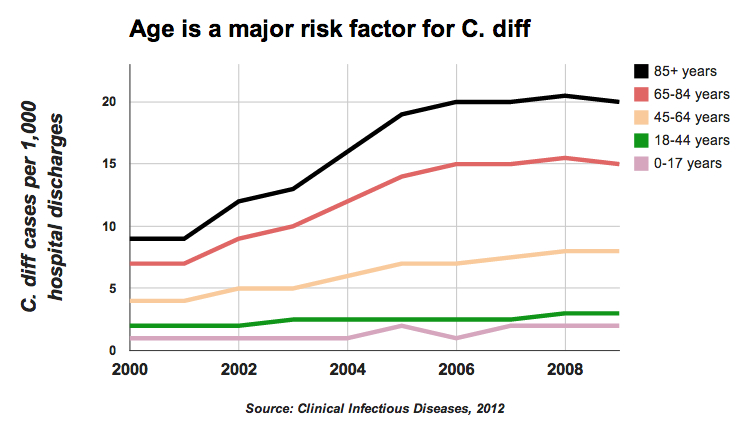Recurrent C. diff: Description and risk factors
Earlier we looked at the C. diff case study of Al, an electrician who contracted Clostridium difficile after receiving dental treatment which required antibiotics. Al’s case illustrates several aspects of recurrent C. diff, a huge problem that occurs in up to 30% of patients who get C. diff after the initial treatment with the antibiotics Flagyl or Vanco. Recurrent C. diff is a huge problem:
- In cases of recurrent C. diff, the infection comes back or recurs within days or weeks of stopping the antibiotics.
- Some unlucky patients experience ten or more recurrences and start to think they will never recover.
After initial “cure” of Clostridium difficile with antibiotics, about 15-25% of patients develop a recurrence within a few days to several months. The chance of a recurrence depends in large part on the type of antibiotic being taken, such as Flagyl, Vanco, or Dificid, as well as the age of the patient.
This repeat infection can keep on recurring, even after multiple courses of antibiotics. We have seen some unfortunate patients with 10 or more attacks of C. diff in a two-year period. It can lead to chronic diarrhea, weight loss, and diminished quality of life.
We think that recurrence of C. diff depends on a “Perfect Storm” of several factors:
- Simultaneous failure of the immune system with inadequate antibody formation
- Failure of the colonic flora to regenerate, owing to exposure to antibiotics.
Failure of the immune system to generate an antibody response is quite common after age 60. The older the patient, the weaker the response to an infection or to vaccination:
During an initial bout of C. diff infection, a healthy immune system develops antibodies that protect against another bout of C. diff infection. But after age 50 or so, this immune response is diminished. That’s why recurrent C. diff infections are much more common in 80 year olds (35%) vs. 40 year olds (10%).
This article about recurrent C. diff was excerpted from C. Diff In 30 Minutes: A guide to Clostridium difficile for patients and families by Dr. J. Thomas Lamont, M.D. To learn more about C. diff, download or purchase a copy.
